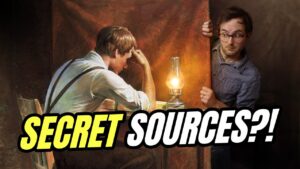Reviews
User Score
Rate This
Descriptions:
On Christmas Day in 1832, Joseph Smith prophesied about not only the United States Civil War, but maybe even both World War I & II. In this episode, David analyzes the prophecy one verse at a time and asks the question – have we not had a prophet among us?
Video transcript: https://saintsunscripted.com/faith-and-beliefs/the-restoration-of-christs-church/did-joseph-smith-predict-the-civil-war/
— Doctrine and Covenants 87: http://bit.ly/3G4S5wZ
— Doctrine and Covenants 130: http://bit.ly/3NXeo9G
— “‘Have We Not Had a Prophet Among Us?’: Joseph Smith’s Civil War Prophecy,” by Scott C. Esplin (BYU Studies): http://bit.ly/3tmTEip
— “Peace and War” by Jed Woodworth in “Revelations in Context”: http://bit.ly/3Tsc8bV
— “Joseph Smith’s 1832 prophecy of the Civil War,” by FAIR: http://bit.ly/3El1eQH
— Here’s a copy of the revelation in John Borrowman’s diary, written Feb. 12, 1854: http://bit.ly/3g5cyas
— Suggested literature:
— “Rough Stone Rolling,” by Richard Bushman, pg 191-192.
— “Making Sense of the Doctrine & Covenants,” by Steven C. Harper, pgs. 310-312, 474-476.
— “The Church and the Civil War,” by David F. Boone, in “Nineteenth-Century Saints at War,” pgs. 115-120.
Notes:
— Why wasn’t this revelation added to the Doctrine and Covenants earlier? Here’s what Brigham Young said:
“Brother Hyde spoke of a revelation which he tried to find in the Book of Doctrine and Covenants. That revelation was reserved at the time the compilation for that book was made by Oliver Cowdery and others, in Kirtland. It was not wisdom to publish it to the world, and it remained in the private escritoire [desk]. Brother Joseph had that revelation concerning this nation at a time when the brethren were reflecting and reasoning with regard to African slavery on this continent, and the slavery of the children of men throughout the world. There are other revelations, besides this one, not yet published to the world.” Source: Journal of Discourses, 8:58.
— There are several different written records of Joseph’s December 25, 1832 revelation. Here are the ones I’ve found:
— Revelation Book 1, in handwriting of John Whitmer: http://bit.ly/3th4mH4
— Revelation Book 1, recorded 17 Feb. 1834 (handwriting of Oliver Cowdery): http://bit.ly/3UP7eqx
— Revelation Book 2, in handwriting of Frederick G. Williams (an interaction of an early, non-extant copy), written between 22 Jan. – 27 Feb. 1833: http://bit.ly/3A3ElyX
— The Book of the Law of the Lord, in handwriting of Robert B. Thompson, written between 1841-1845 (interestingly, this copy says “remnant” instead of “remnants”): http://bit.ly/3hAIhk0
— “In addition to [Wilford] Woodruff’s personal copy, historian Robert Woodford identified eight other manuscript copies of the prophecy on war, including reproductions in the handwriting of William W. Phelps, Thomas Bullock, Willard Richards, and Edward Partridge” Source: http://bit.ly/3tmTEip
— There are several different written records of Joseph’s April 2, 1843, reaffirmation of the 1832 Civil War prophecy. Some accounts are worded slightly differently than others. For curious minds, here they are (at least, these are the one I’ve found):
— The earliest source I’ve found: William Clayton’s journal: http://bit.ly/3WV7DJY
— Joseph Smith’s journal, in handwriting of Willard Richards (who likely took his info from William Clayton’s journal): http://bit.ly/3UBaC8i
— From the manuscript history of the Church (written in 1850s), handwriting of Thomas Bullock (this seems to be the version ultimately adopted into the D&C): http://bit.ly/3A5nLP8
— History draft, in handwriting of Thomas Bullock (this just looks like a preliminary draft of the manuscript history document): http://bit.ly/3TrjIDJ
— The Confederates did call on the British (and the French) for support in the war. Formally, the British were neutral in the conflict. That said, there was a lot happening under the table to support the Confederacy.
— Less than two weeks after receiving the revelation in 1832, Joseph wrote a letter to a New York newspaper editor named N. C. Saxton. He wrote, “I am prepared to say by the authority of Jesus Christ, that not many years shall pass away before the United States shall present such a scene of bloodshed as has not a parallel in the history of our nation; pestilence, hail, famine, and earthquake will sweep the wicked of this generation from off the face of the land.” This portion of the letter was published by the American Revivalist on 2 February 1833. Joseph had intended for the entire letter to be published, and sent a disapproving letter shortly after.
SUBSCRIBE:
http://saintsunscripted/subscribe
Follow Us:
Facebook: https://www.facebook.com/SaintsUnscripted/
Instagram: https://www.instagram.com/saintsunscripted/
Website: https://saintsunscripted.com/
Follow the Hosts:
David: https://www.instagram.com/davidesnell/
Taylor: https://www.instagram.com/tsyorg/










